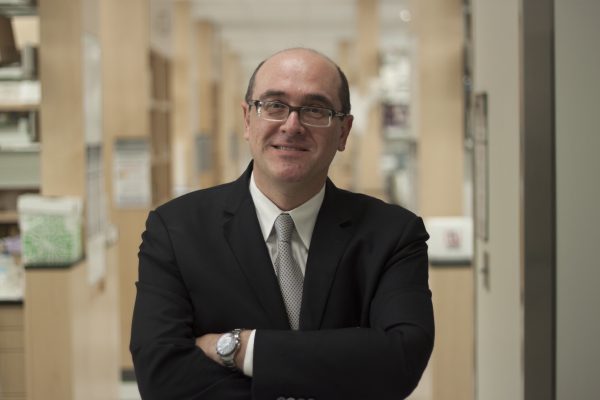August 12, 2020

Alexander “Sasha” Kabanov, Ph.D., Dr.Sci., recently received a five-year renewal of his T32 Carolina Cancer Nanotechnology Training Program (CCNTP), totaling more than $2.3 million in funding.
The Carolina Cancer Nanotechnology Training Program is a 24-to 36-month National Cancer Institute–sponsored T32 postdoctoral training program offered at the UNC Eshelman School of Pharmacy.
The overarching goal of the CCNTP is to equip a cohort of outstanding young scientists with the multidisciplinary concepts and skills needed to improve cancer diagnosis and therapy based on concepts, tools and discoveries made in nanoscience and nanotechnology. Following the program, Kabanov said trainees become significant contributors to addressing emerging challenges in public health and medical research using nanotechnology to diagnose and treat cancer.
“Competitive renewal of the training program grant is an important and ultimate exam for what we did in the previous five years and what we propose to do for the next five years. The fact that we passed this exam with NIH is a very important testament of the strength of the program and empowers us to do more in the future. We aim to train a diverse group of excellent scientists and innovators in the area of nanomedicine to improve human health,” Kabanov said.
Each trainee’s research is co-mentored by a physical scientist and a biomedical scientist, providing a unique multifaceted training experience. Additionally, trainees participate in workshops and courses that broaden their knowledge and conceptual understanding of all areas of cancer nanotechnology.
“Our T32 Carolina Cancer Nanotechnology Training program is highly unique as it has a strong emphasis on cancer biology and clinical medicine in addition to nanotechnology. Our graduates are well rounded researchers that are poised to become leaders of the field and make strong impacts on cancer care. This renewal will ensure that we will continue to train tomorrow’s research leaders. In addition, it will greatly enhance our overall anomedicine research program, which is one of the largest in the world,” said Andrew Wang, M.D., of Lineberger Comprehensive Cancer Center, co-director of the program.
Emily Harrison, Ph.D., began theT32 Carolina Cancer Nanotechnology Training Program in 2016. About the program, she said, “The T32 allowed me to have more independence as a postdoc and gave me the opportunity to attend several prestigious conferences, increasing my exposure to the national and international scientific community. I am especially thankful to have a supportive group of fellow postdocs, who I consider friends, colleagues, and collaborators.”
Harrison said the program launched her research and career development, which in turn led her to be selected for a career development award from the Lung Cancer Initiative of North Carolina.
“I am excited that more scientists will have the opportunity to train at UNC with the resources and benefits of this T32, I look forward to meeting them,” she said.
Latest News

Dean Angela Kashuba receives Carolina Alumni Faculty Service Award

RASP poster presentations capture student research


